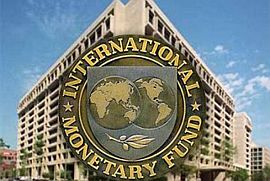Analytics, Economics, EU – Baltic States, Financial Services, Latvia
International Internet Magazine. Baltic States news & analytics
Sunday, 08.02.2026, 00:13
IMF projects Latvia will record fastest growth in Central and Eastern Europe
 Print version
Print version |
|---|
It confirmed its April forecast for growth in the region of 2.25% this year, and 2.75% in 2014. That compares with 5.25% growth in 2011, which plunged to 1.5% last year.
"However, there are large differences across countries, with strong growth in Turkey and the Baltics, an incipient recovery in southeastern Europe and Hungary, and further weakening in Poland," it said its October World Economic outlook.
Aside from weak market demand from the eurozone – its key export market which recovered from recession in the second quarter of this year –- the region has suffered from western European banks pulling back funds from their central and eastern European operations.
The IMF predicts four% growth for Latvia this year, and 4.2% growth next year, which would be the fastest growth amongst eastern and central European countries in 2014. Meanwhile, the IMF believes Lithuania's GDP will increase 3.4% this year, and 3.4% next year, while Estonia's economy is expected to grow 1.5% this year, and 2.5% next year.
Countries like Croatia, Hungary and Poland with strong trade links to the eurozone are vulnerable to any downturn in the recovering bloc, it noted.
Financial market volatility poses the main risk to Turkey and Serbia as they are burdened by "relatively large fiscal or external imbalances".
Central European heavyweight Poland is forecast to "decelerate from two% in 2012 to 1.24% this year, picking up to 2.25% in 2014." Poland was hit not only by the slowdown in the eurozone but by its once strong domestic demand weakening, the IMF noted.
After a downturn in 2012 caused in part by bad weather, southeastern Europe is now recovering. Croatia "will remain in a mild recession" and activity in Hungary will be "broadly flat this year, recovering by 1.25% in 2014."
Moderate economic growth "will keep a lid on inflation pressure", with the notable exceptions of Turkey and Serbia where the IMF forecasts annual average inflation to hit 6.5 and 8.25% respectively.
For Bulgaria, Croatia and Poland, where a large share of high unemployment appears to be structural, the IMF recommended "a bold reform agenda (...) to alleviate growth bottlenecks." It also urged "a differentiated policy response" to tackle debt loads amid volatility on financial market.
The IMF classifies nine countries including European Union members Poland, Romania, Hungary, Bulgaria, Lithuania and Latvia along with non-EU Turkey, Serbia and Croatia as part of the emerging European economies.
EU members in the region including Slovakia, Slovenia and Estonia which have already joined the eurozone are classified by the IMF as belonging to "advanced Europe", as is the Czech Republic which has not yet joined the single currency bloc.








 «The Baltic Course» Is Sold and Stays in Business!
«The Baltic Course» Is Sold and Stays in Business!

